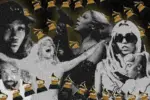“Remi Wolf is a crazy bih but is also hella nice and sweet sometimes but also likes to yell at people but has figured out that maybe instead of yelling at people she can just sing and scream at people on stage when she’s in the mood to make money and act like a daddy dom,” according to Wolf’s Spotify biography.
Her new album “Juno” resembles the description in her bio as she uses her “nice and sweet” upbeat tracks to camouflage her passionate and often distressed “yelling” to her listeners. Wolf’s musical style is something refreshingly hallucinogenic relative to the overdone pop genre. She uses her uninhibited emotions to make her music come to life in an aesthetically pleasing way.
The 40-minute “Juno” consists of 13 tracks that speak to younger generations and how they’re coping with life today. Living in unforeseen times has led people to become more self-aware, thus becoming more in tune with emotions that are often left unexamined.
“Juno” dives into uncertainty, addiction and mental health struggles while maintaining an optimistic beat that may fool listeners into thinking this album is just lighthearted and upbeat, ignoring the creatively raw expression Wolf pulls off. Her definitive goal for “Juno” is to express the love someone must have for themselves to push forward and live life even when they feel it’s in shambles.
Liquor Store
Wolf’s first track on “Juno” is titled “Liquor Store” and is a particular favorite. Everyone has their own take on the song’s explicit meaning, which makes the song and the album itself much more meaningful to each fan of her music. Some personal and not entirely set-in-stone themes in “Liquor Store” include the fear of abandonment, drugs as an escape, and the uncertainty of life as one lives it. The song expresses these themes in a metaphor:
“You can go if you want to
But you know my mind will be walking a tight rope
‘Cause you like having sex like an animal
And I keep thinking you’re running away from.”
The fear of one’s romantic partner just getting up and leaving is common. Sometimes, and maybe more than one would like to admit, people push away the ones who care the most just to avoid the possibility of rejection. The feeling can be mutual, as one person may feel the other pushing away at the same time the other fears them pulling away.
Wolf’s lyrics further evoke the idea that the most profound thoughts and feelings one possesses cause them to always be “walking a tight rope.” The lyrics signal that many people tend to overthink and over-assume; thus, they are constantly in a mindset where they think no one could accept them for who they are. There’s so much more to this song than these four lines, but it’s up to Wolf’s listeners to decode her words for themselves and figure out what “Liquor Store” means for them.
Guerrilla
Considering that the Merriam-Webster dictionary defines a guerrilla as “a person who engages in irregular warfare especially as a member of an independent unit carrying out harassment and sabotage,” it’s not a far-fetched theory that “Guerrilla” is a funky and rhythmic tune of self-sabotage. Some of Wolf’s lines in the pre-chorus read:
“Hiding my mind, smoke away the depression
Damn, that guy he keeping me guessin’
Bolo ties, why’s he making impressions?
Look like my exes.”
It is implied that Wolf had been using substances, in this case, alcohol and weed, to distract her from her depression and toxic behaviors. By hiding her mind, she is not in a conscious state of being to evaluate the life in front of her. Allowing someone similar to her past partner to pique her interest and impress her indicates that Wolf is falling into old habits that do not serve her. Her partying, drug abuse and inebriated pursuit of unavailable partners are just ways to distance herself and fall deeper into a bottomless pit of despair.
Quiet on Set
In this song, Wolf reflects on how her life at the time made her feel “overworked, manic, reckless, and childish,” according to Genius. This track serves as a reminder to never assume that a spunky and fun rhythm signifies light life themes. Some unforgettable lines from “Quiet on Set” include:
“Shh
Quiet on set (Run it)
I been takin’ my bets (Frontin’)
I been payin’ my debts (Love it)
I been stealing Corvettes (Stuntin’).”
The behavior Wolf describes resembles how many people feel, especially during the pandemic. The combination of truth and sarcasm creates a relatable person who, at the time, is just going through the motions. In a way, life is a long movie, but there are no breaks or time jumps like in many films and shows. People don’t get to fast forward their lives — they must live. While it’s tough to be in the gray area of life, most of life is in the gray area. This realization forces people to reevaluate their lives and ask themselves: How can they feel something besides the mundane? Wolf continues the chorus with the lines:
“Quiet on Set (Run it)
I been fucked in the head (Frontin’)
I ain’t leavin’ my bed (Love it)
The work be killin’ me dead (Stuntin’).”
The repercussions humans face just by living are gargantuan. A toxic work mindset deceives people into believing they must live to work. Mental health is often neglected by society; reckless and childish behaviors stem from anything like unhealthy and unstable relationships in the past or present to a lack of parental involvement as a child. It could be argued that Wolf is blatantly telling her story as a human who struggles with life like the rest of the world, and that’s refreshing.
Sexy Villain
“Sexy Villain” is one of the more chill songs on “Juno.” It seems to take the perspective of a sexy-villain alter ego that Wolf decided to embody at a time in her life. Wolf told Genius that when writing the laid-back and groovy pop track, she was in a weird place in her relationship and felt like the “bad guy” in many situations. In verse one, her lyrics read:
“Draw blood with the way I hold your heart
Keep my eyes closed when I throw darts
Billy Bob and Angelina
Get my milk from Altadena
I can move to Pasadena
Just to be your serial killer, killer.”
Wolf’s relationship has taken a sour turn, making her feel like a lousy person. She begins to behave passive-aggressively by mistreating her partner. She may have sent insults or disrespect to her partner but not taken accountability. The kind of vulnerability Wolf is willing to show demonstrates that humans can make mistakes. Taking responsibility also proves humans are capable of change even when they’ve acted out or said unkind things in the past. Wolf admits she was a symbolic serial killer and realizes she was a villain in her relationship — and perhaps life. The post-chorus repeats the lines:
“Tip tip tippy toe, tip tip tippy toe, tip toe
Tip tip tippy toe, tip tip tippy toe, tip toe
Tip tip tippy toe, tip tip tippy toe, tip toe
Tip tip tippy toe, tip tip tippy toe, tip toe.”
Wolf acknowledges she had tiptoed around the truth of her situation and dismissed it several times before the epiphany presented itself, allowing her to grow into the person she is now.
Street You Live On
The last but certainly not least track on “Juno” is “Street You Live On.” A solid ending to a more chaotic album highlights people’s ability to leave toxic situations and relationships behind. With a chant-like usage of different vocals from Wolf, she reiterates the lyrics:
“I avoid the street that you live on
You’re a magnet pulling my feet and my head off
And I scramble my brain
Wasting away
Looking for ways that I can avoid you
To pull the weeds, suck the venom.”
Wolf intentionally avoided the person she was trying to move on from. She is aware this person is not compatible with her; they cause her a significant amount of suffering, and she feels that she is wasting away from the energy she expends on this person. Reassuringly enough, Wolf tries to keep her distance and focus on herself, removing herself from hostile environments. This song is an almost perfect closing to an album filled with the downfalls, stresses and growth of the human species.
Ending Thoughts
Connection with others is something to be thankful for since life is a turbulent tempest. Life is messy, complicated and hurtful, but more importantly, it always offers a learning moment where growth is a reality, like the passage of time. “Juno” is like a dark period in life, a cringy movie scene or an eight-minute-long music video; it feels like it will never end, but it eventually does.
















